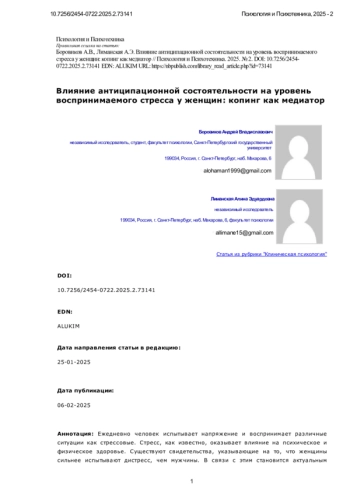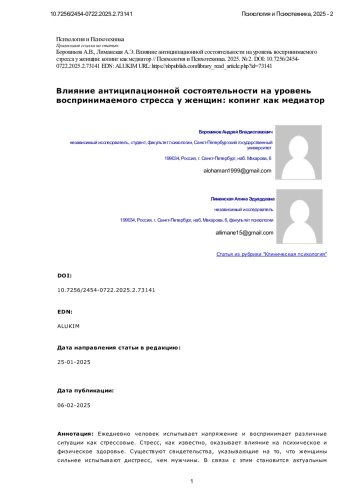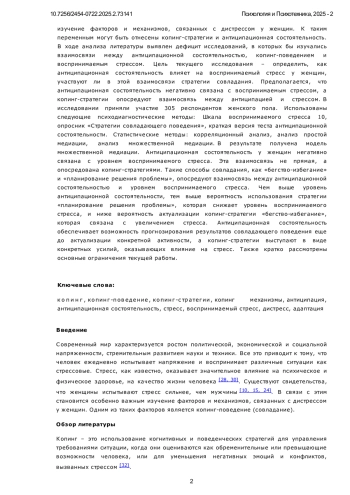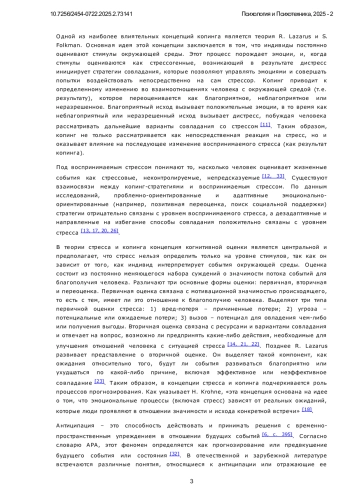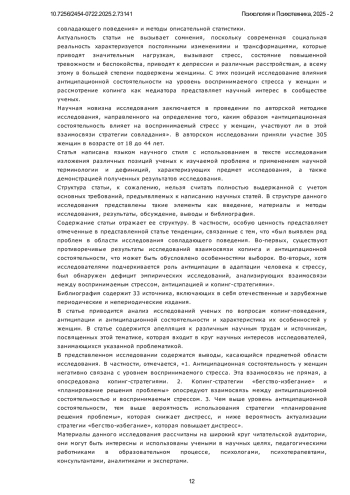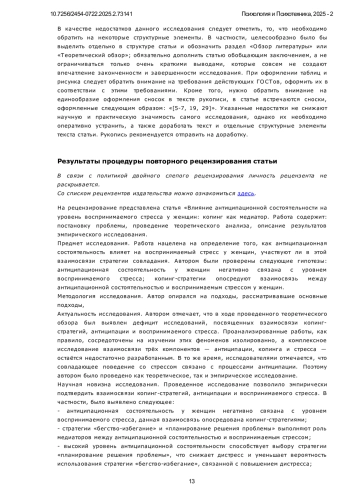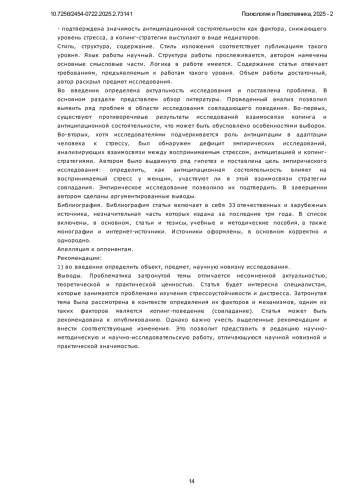1. Абабков В.А. и др. Валидизация русскоязычной версии опросника “Шкала воспринимаемого стресса-10” // Вестник Санкт-Петербургского университета. Психология. 2016. № 2. С. 6-15.
2. Абитов И.Р. Особенности совладания со стрессом в норме и при психосоматических и невротических расстройствах // Психологический журнал. 2013. Т. 34. № 1. С. 86-96.
3. Абитов И. Р. и др. Взаимосвязь копинг-стратегий студентов с некоторыми особенностями личности // Психология стресса и совладающего поведения: ресурсы, здоровье, развитие: материалы IV Международной научной конференции: в 2-х томах, Кострома, 22-24 сентября 2016 года / под. ред. Т. Л. Крюкова, М. В. Сапоровская, С. А. Хазова. Кострома, 2016. Т. 1. С. 274-276.
4. Вассерман Л.И. и др. Методика для психологической диагностики совладающего поведения в стрессовых и проблемных для личности ситуациях: пособие для врачей и медицинских психологов. СПб.: Психоневрологический институт имени В.М. Бехтерева, 2008. 35 с.
5. Ерзин А.И., Ковтуненко А.Ю. Нейропсихология антиципации-1: Монография. М.: Академический проект, 2020. 207 с.
6. Ломов Б.Ф. Психическая регуляция деятельности: Избранные труды. М.: Институт психологии РАН, 2006. 624 с.
7. Менделевич В.Д. Антиципационные механизмы неврозогенеза. М.: Городец, 2018. 448 с.
8. Старченкова Е.С. Концепция проактивного совладающего поведения // Вестник Санкт-Петербургского университета. Социология. 2009. № 2-1. С. 198-205.
9. Agafonova E. V., Granitsa A.S., Makaricheva E. V. Development of a short version of the test of anticipatory solvency // Neurology Bulletin. 2023. Vol. 55. No. 3. P. 21-30.
10. Anbumalar C. et al. Gender differences in perceived stress levels and coping strategies among college students // The International Journal of Indian Psychology. 2017. Vol. 4. No. 4. P. 22-33.
11. Biggs A., Brough P., Drummond S. Lazarus and Folkman’s psychological stress and coping theory // The handbook of stress and health: A guide to research and practice. 2017. P. 349-364.
12. Cohen S., Kamarck T., Mermelstein R. A global measure of perceived stress // Journal of health and social behavior. 1983. P. 385-396.
13. Enns A. et al. Perceived stress, coping strategies, and emotional intelligence: A cross-sectional study of university students in helping disciplines // Nurse education today. 2018. Vol. 68. P. 226-231.
14. Folkman S. et al. Dynamics of a stressful encounter: cognitive appraisal, coping, and encounter outcomes // Journal of personality and social psychology. 1986. Vol. 50. No. 5. P. 992.
15. Graves B.S. et al. Gender differences in perceived stress and coping among college students // PloS one. 2021. Vol. 16. No. 8. P. e0255634.
16. Groth N. et al. Coping as a mediator between locus of control, competence beliefs, and mental health: A systematic review and structural equation modelling meta-analysis // Behaviour research and therapy. 2019. Vol. 121. P. 103442.
17. Kausar R. Perceived stress, academic workloads and use of coping strategies by university students // Journal of behavioural sciences. 2010. Vol. 20. No. 1.
18. Krohne H.W. Stress and Coping Theories // International Encyclopedia of the Social & Behavioral Sciences. 2001. P. 15163-15170.
19. Kube T. et al. How the discrepancy between prior expectations and new information influences expectation updating in depression-the greater, the better? // Clinical Psychological Science. 2022. Vol. 10. No. 3. P. 430-449.
20. Kumanova M.V., Karastoyanov G.S. Perceived stress and coping strategies // Bulgaria, Pernik. 2013. P. 5.
21. Lazarus R.S., Launier R. Stress-related transactions between person and environment // Perspectives in interactional psychology. Boston, MA: Springer US, 1978. P. 287-327.
22. Lazarus R.S., Folkman S. Transactional theory and research on emotions and coping // European Journal of personality. 1987. Vol. 1. No. 3. P. 141-169.
23. Lazarus R.S. Progress on a cognitive-motivational-relational theory of emotion // American psychologist. 1991. Vol. 46. No. 8. P. 819.
24. Matud M.P. Gender differences in stress and coping styles // Personality and individual differences. 2004. Vol. 37. No. 7. P. 1401-1415.
25. Nicholls A.R. et al. The mediating role of coping: A cross-sectional analysis of the relationship between coping self-efficacy and coping effectiveness among athletes // International Journal of Stress Management. - 2010. Vol. 17. No. 3. P. 181.
26. Onieva-Zafra M.D. et al. Anxiety, perceived stress and coping strategies in nursing students: a cross-sectional, correlational, descriptive study // BMC medical education. 2020. Vol. 20. P. 1-9.
27. Pereira-Morales A.J. et al. Personality traits and health-related quality of life: the mediator role of coping strategies and psychological distress // Annals of general psychiatry. 2018. Vol. 17. P. 1-9.
28. Ribeiro I.J.S. et al. Stress and quality of life among university students: A systematic literature review // Health Professions Education. 2018. Vol. 4. No. 2. P. 70-77.
29. Schacter D.L., Benoit R.G., Szpunar K.K. Episodic future thinking: Mechanisms and functions // Current opinion in behavioral sciences. 2017. Vol. 17. P. 41-50.
30. Schneiderman N., Ironson G., Siegel S.D. Stress and health: psychological, behavioral, and biological determinants // Annu. Rev. Clin. Psychol. 2005. Vol. 1. No. 1. P. 607-628.
31. Tindle R., Hemi A., Moustafa A.A. Social support, psychological flexibility and coping mediate the association between COVID-19 related stress exposure and psychological distress // Scientific Reports. 2022. Vol. 12. No. 1. P. 8688.
32. VandenBos G.R. APA Dictionary of Psychology // American Psychological Association. - 2007.
33. Wang S. et al. Stress and the brain: perceived stress mediates the impact of the superior frontal gyrus spontaneous activity on depressive symptoms in late adolescence // Human brain mapping. 2019. Vol. 40. No. 17. P. 4982-4993.
